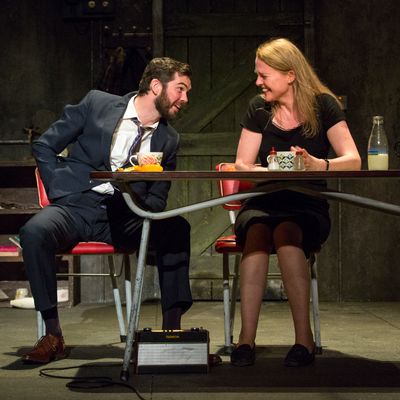
In a dank and grimy cottage in a small town in remote Connemara live the embittered fortyish spinster Maureen Folan and her spiteful mother, Mag, whose name rhymes with “hag” for good reason. Even in a local microculture defined by disappointment, vengefulness, lunacy, and complaint, they are egregious. Mag blithely empties her chamber pot in the kitchen sink every morning, despite constant instruction to the contrary and her well-publicized “urine infection.” Maureen seems even worse, at first, mechanically engaging in such pointless cruelties as refusing to stir the lumps out of her mother’s nutritional supplement. Nor is this an undeclared war. When Mag tuts over news of a man who “up and murdered the poor oul woman in Dublin, and he didn’t even know her” — making a strangling seem like a faux pas — Maureen is unimpressed. “Sure, that sounds exactly the type of fella I would like to meet,” she says, “and then bring him home to meet you, if he likes murdering oul women.”
This is the hilariously grim, stage-Irish world of Martin McDonagh’s The Beauty Queen of Leenane, now enjoying a bang-up 20th-anniversary encore run at BAM, in a production by the Galway company Druid. Astonishingly, Beauty Queen was McDonagh’s first play, picked virtually off the slush pile in 1996 by Druid co-founder Garry Hynes, who directed then as now. What she found in Beauty Queen was not only something gorgeously playable but also something new and fully formed, as McDonagh’s subsequent plays (including The Cripple of Inishmaan, seen on Broadway recently in a terrific revival starring Daniel Radcliffe) have demonstrated in ever more poisonous concentrations. In all of them, awful people do awful things to people only slightly less awful, which renders the doings funny. But his grotesques are just recognizable enough to make at least some of them worth your empathy, and his style is so lean you can see bone at all times.
In Beauty Queen this means you are always aware that things will not end well, even as the play sets a trap you eagerly leap into. When Maureen’s neighbor Pato Dooley, a handsome man of about her own age, returns briefly to Leenane from his work as a construction laborer in London, he invites her to a party; even though Mag burns the invitation in the stove, Maureen finds out and attends. There follows a scene of such tender late-night pleasure — shyness, boldness, doubt, reassurance — that you may be suckered into believing that McDonagh has lost his no-hope nerve. But he’s playing a long game. In this where-can-it-go courtship scene, and later when Pato writes a letter to Maureen that offers a viable way out of her misery (and, not incidentally, out of Ireland), McDonagh provides just enough rom-com thrill to hook Maureen and the audience before yanking the hook out again, as if through flesh. His is a dramaturgy of deprivation, which means first provisioning his characters with something he can take away.
Dark comedy, it’s often called, but the phrase isn’t nearly dark enough for this esthetic. Beauty Queen may be funny in the way a YouTube video of a man diving into a frozen pool can be, but it’s no comedy. Rather, it exists somewhat beyond our traditional genre definitions, encompassing many of them. It’s a satire of Irishness and Irish drama of course, with its peat stoves and cow fixations and eejit chatterboxes. (Aaron Monaghan, in this case, plays the requisite local moron.) It’s a horror tale, too, as the women, once Pato is dispatched, engage in a witchlike battle for supremacy of their horrid little realm. And for all its laughs it’s also a tragedy, in which even the satisfaction of Maureen’s prime objective — she does, in the end, get free of Mag — fails to make a difference. She just becomes Mag instead of fighting her.
Or would if Hynes’s generally expert staging, with a new cast on a replica of the original set by Francis O’Connor, didn’t falter slightly in its interpretation of the women. Marie Mullen, who was Maureen in 1996, has graduated to Mag for this production, providing an apt meta-theatrical kick: We grow into our monsters. Still, she leans a bit too hard into some of the comedy, almost winking at the audience on occasion. (The late Anna Manahan, who won a Tony award as the original Mag, was unfalteringly ferocious.) Meanwhile, Aisling O’Sullivan, otherwise quite moving as Maureen, is hampered by a different kind of problem: She’s way too pretty for the role. (McDonagh’s stage directions describe Maureen as “plain.”) When Pato (Marty Rea, heartbreakingly sincere) calls her “the beauty queen of Leenane,” the line is meant to reflect a lover’s myopia; it thrills Maureen but also makes her doubt his sincerity. Even if you make a mental adjustment to recategorize her sense of ugliness as psychological, the visual truth — she’s inarguably sexy in a black party dress that’s supposed to seem desperate — flattens the layers of irony built into the title, and thus to a slight extent the drama.
But those are quibbles, and perhaps a little nudge toward the comedy is not unwarranted in 2017. In any case, it’s not the kind of play I can imagine would ever really fail, whatever way you balance it. Like the best work in any dramatic genre, it is almost unanswerable, a block of life, however exaggerated, that fell onto the stage in one piece. Look underneath it and you’ll find a lot of crushed people.
The Beauty Queen of Leenane is at the BAM Harvey Theater through February 5.

